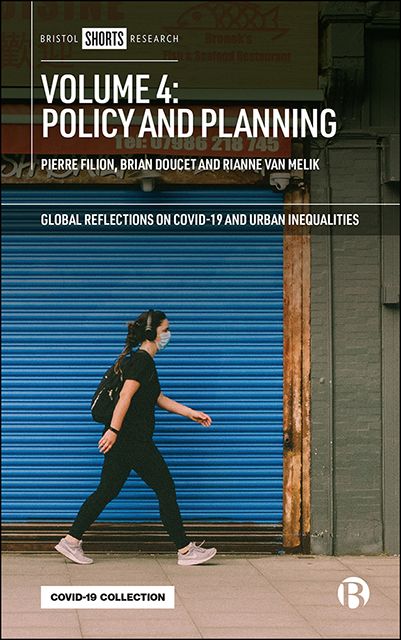Book contents
- Frontmatter
- Contents
- List of Figures and Tables
- Notes on Contributors
- Acknowledgments
- Preface to All Four Volumes of Global Reflections on COVID-19 and Urban Inequalities
- One Introduction: Policy Making in the Face of Uncertainty and Inequality
- Part I COVID-19 and Urban Changes
- Part II The Pandemic, Social Inequality, and Mobilization
- Part III Municipal and Urban Policy Responses
- Index
Sixteen - Public Transport Qualities and Inequalities in Pandemic Times
Published online by Cambridge University Press: 25 April 2023
- Frontmatter
- Contents
- List of Figures and Tables
- Notes on Contributors
- Acknowledgments
- Preface to All Four Volumes of Global Reflections on COVID-19 and Urban Inequalities
- One Introduction: Policy Making in the Face of Uncertainty and Inequality
- Part I COVID-19 and Urban Changes
- Part II The Pandemic, Social Inequality, and Mobilization
- Part III Municipal and Urban Policy Responses
- Index
Summary
Introduction
In spring 2020, the advent of the COVID-19 pandemic caused a mobility crisis. Municipalities and operators faced novel challenges in keeping public transport systems running. Media outlets and officials stigmatized public transport as sites of potential infection, leading to unprecedented decrease of ridership, closure of transport networks, and gloomy predictions about the ‘end of public transport’ in the US (De La Garza, 2020), the UK (Clark, 2020), and Germany (Schwenn and Hauser, 2020). In response, technical-managerial safety measures were applied, such as disinfecting vehicles or fencing off and limiting spaces to enforce physical distancing (UITP, 2020a). Yet, these responses remain only partially effective. Moreover, they have worsened working conditions for public transit staff by disregarding their needs. For instance, bus drivers in Stockholm described fearing for their lives when many of their colleagues contracted the virus, and some died. Despite this situation, during the first weeks of the pandemic, authorities refused closing front doors in vehicles.
Policies further failed to account for the affective side of public transport and to consider users’ expectations, feelings as well as their fears and hopes regarding post-pandemic transport futures (Centers for Disease Control and Prevention (CDC), 2020). The sudden breakdown of mobility networks and routines is of great social significance, as the ‘freedom of movement, as represented in popular media, politics and the public sphere, is the ideology and utopia of the twenty-first century’ (Grieco and Urry, 2011: 4). Interrupted global supply chains, the closure of metro networks, deserted transportation hubs, and locked borders fundamentally contradict the capitalist paradigm that equates movement with individual and collective prosperity. Moreover, the impact of the pandemic on mobility appears to be socially and spatially uneven, raising questions of mobility justice (Sheller, 2018). How do hierarchies of perceived risk and stigma intersect with existing hierarchies of access and use? Who gets to move around safely, and feel safe as they move?
We discuss qualities and inequalities of public transport not only by looking at ridership figures, but also by considering ambiances, mundane experiences, and power structures. To understand user perspectives, we conducted an online survey (collecting 2,164 responses to our questionnaires, 1,095 completely filled) in various European countries, and qualitative semi-structured interviews, focusing on cities in Belgium (17), Estonia (10), Germany (10), and Sweden (10). The research was carried out from May to August 2020.
- Type
- Chapter
- Information
- Volume 4: Policy and Planning , pp. 169 - 178Publisher: Bristol University PressPrint publication year: 2021



